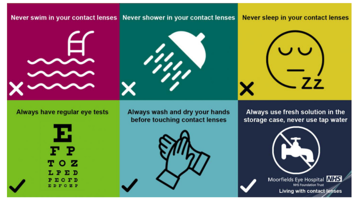At Moorfields Eye Hospital our specialists have noticed a big rise in cases of acanthamoeba keratitis. We want everyone to enjoy the freedom that contact lenses offer and give you some basic but vital steps to follow to keep your eyes healthy.
Take Sairia, one of our patients who lost a year of her university course and badly damaged her sight due to poor contact lens care.
video transcript
Stick to these tips to keep your eyes healthy:
Do:
- Have a regular check-up with your optician.
- Always wash and dry your hands prior to handling your lenses.
- Always rub, rinse and store your lenses in the recommended solution before and after each use.
- Check the lens are not inside out before putting them in your eye.
- Apply your lenses before putting on make-up.
Don’t:
- Use tap water or any other water on your lenses or lens case.
- Sleep in your lenses.
- Wear contact lenses while swimming or showering.
- Share your lenses with anyone.
What should contact lens wearers avoid?
These diseases can be contracted anywhere in the UK, and the risk of infection is raised if people:
- wear contact lenses in the shower or when swimming.
- sleep in lenses (unless your optician has told you to do so).
- do not wash or dry their hands before touching their contact lenses.
- leave their lenses in water overnight or spit on them when they are dry or have fallen out of the eye.
- over wear their lenses, including disposable ones.
Diseases that can result from poor contact lens care
- Corneal infection (known as microbial keratitis) in contact lens wearers affects around four per 10,000 wearers each year and is mainly caused by bacteria which stick to contact lenses. These microorganisms become more resistant and harmful.
- Acanthamoeba keratitis is a more rare form of microbial keratitis, occurring in around two per 100,000 wearers per year, although it varies regionally. It is a more severe form of infection and 85% of cases occur in contact lens wearers who are otherwise fit and healthy.
- Fungal keratitis can also occur with contact lens wear but occurs most often in people who sustain eye injuries from agricultural or gardening accidents, ocular surface disease and those with immunosuppression. This infection, like acanthamoeba keratitis is one of the severest forms of corneal infection that can occur in contact lens wear.
Healthy eyes, healthy habits
If you wear contact lenses, keep your eyes healthy and prevent eye infections by following these tips:
Your habits
- Wash and dry your hands before touching your contact lenses.
- Don't sleep in your contact lenses (unless your eye doctor tells you otherwise).
- Avoid wearing contact lenses while showering, swimming, or using a hot tub
Your supplies
- Rub and rinse your contact lenses with solution each time you clean them. Never use water or spit!
- Use only the solution your eye doctor tells you to use.
- Only use fresh disinfecting solution in your case - don't mix new with old.
- Never store your contact lenses in water.
- Replace your contact lenses as often as your optician says.
- Rub and rinse your case every day with solution, dry with a clean tissue, and store upside down with the cops off.
- Get a new case at least every three months.
Your optician
- Visit your optician once a year - or more often if needed.
- Ask questions about how to care for your lenses and case
- Take out your contact lenses and call your optician if you hove eye pain, red eyes, or blurred vision.
And remember: always be prepared!
Carry a pair of glasses in case you need to take out your contact lenses.

Eye care tips
More than two million people in the UK are living with ‘avoidable sight loss’ – but there are some simple things you can do now to help take care of your eyes.
- KnowYourDrops
If you've been prescribed eye drops for your condition, remember to follow instructions on how and when to administer them. Aiming eye drops at the correct angle or squeezing plastic containers can be difficult. Our short video below explains how best to put in your eye drops.
- Contact lens care
Remove your contact lenses before having a wash or showering to reduce your risk of eye infection. It's also important to buy your contact lenses from an approved, registered practitioner. Buying lenses, dailies or cosmetic, off the internet can put your eyes at risk.
- Carrots are good for your eyes
Eating a healthy, balanced diet and drinking a moderate amount of alcohol can reduce your risk of developing common eye conditions. Eye friendly nutrients are found in many fruits and vegetables, including carrots!
- Stub it out
Smoking causes damage to the eyes, which can be prevented. If you quit smoking, your risk of developing eye conditions such as age-related macular degeneration begins to decline.
- Screen breaks
Take regular breaks from screens to help prevent eye strain and dry eyes. Prolonged use can lead to blurred vision, eye fatigue, dry eyes and headaches. Set up your screen in the correct position, and take regular breaks.
- Sight tests
Have regular sight tests and keep up with your eye care appointments. It is recommended that you have an eye examination once every two years. This will identify any problems with your vision and can prevent further sight loss.
Did you know children aged under 16 qualify for a free NHS-funded eye test?